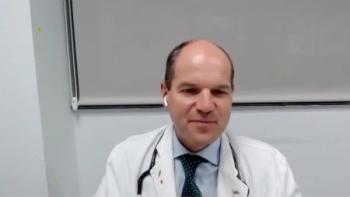
A possible connection between integrase strand-transfer inhibitor (INSTI) use for HIV and cardiovascular disease (CVD) was investigated in this new study from an international team wanting more knowledge on the drug class’s treatment effects.

Maggie is a senior editor for The American Journal of Managed Care® (AJMC®) and produces written, video, and podcast content covering several disease states. She joined AJMC® in 2019, and has been with AJMC®’s parent company, MJH Life Sciences®, since 2014, when she started as a copy editor.
She has a BA in English from Penn State University. You can connect with Maggie on LinkedIn.

A possible connection between integrase strand-transfer inhibitor (INSTI) use for HIV and cardiovascular disease (CVD) was investigated in this new study from an international team wanting more knowledge on the drug class’s treatment effects.

Debra Patt, MD, PhD, MBA, executive vice president of Texas Oncology, discusses the path of telemedicine reimbursement during the pandemic and possible ways it will change after the pandemic.

Using the Nationwide Inpatient Database for trends studied between 1993 and 2011, investigators from Columbia University Irving Medical Center evaluated hospitalization outcomes among patients with heart failure and comorbid gout.

The findings of this study, which used insurance claims data for patients 2 years and older to determine rates of meningococcal A, C, W, Y vaccine uptake, points to the need for more education, the authors said.

In this study, Italian investigators evaluated how sacubitril/valsartan (Sac/Val) dose titration among older patients with heart failure with reduced ejection fraction (HFrEF) might affect reverse cardiac remodeling and if the success of up-titration can be predicted.

Investigators from the Pediatric Diabetes Center at Hassenfeld Children’s Hospital at NYU Langone investigated outcomes disparities as they related to diabetes technology use among youth living with type 1 diabetes (T1D).

Bruce House in Ottawa, Ontario, Canada, has been serving individuals living with HIV and AIDS for 34-plus years. Here we speak with Patrick Morley, office and communications coordinator.

Debra Patt, MD, PhD, MBA, executive vice president of Texas Oncology, discusses how enhancements to telemedicine precipitated by the COVID-19 pandemic have made lasting and meaningful changes to oncology care, including that these care improvements will persist post pandemic.

Outcomes in this new study, conducted among patients with chronic heart failure (CHF) on maintenance dialysis and receiving sacubitril/valsartan, were evaluated as they pertained to heart function and blood pressure.

The primary outcomes of this secondary analysis of the MOTIVATE-HF study were improvement in caregiver self-efficacy while caring for patients living with heart failure and caregiver contributions to self-care for these patients following motivational interviewing.

Hope S. Rugo, MD, FASCO, is professor of medicine and the director of the Breast Oncology and Clinical Trials Education program at the University of California San Francisco Helen Diller Family Comprehensive Cancer Center. She discusses her experience with palbociclib and letrozole in advanced breast cancer.

The new trial was the first to investigate outcomes among a patient population living with HIV (PLWH) who were treated for anal precancerous growths, or high-grade squamous intraepithelial lesions.

Roxana Siles, MD, FAAAAI, staff in the Department of Allergy and Immunology at Cleveland Clinic and codirector of the Asthma Center at Cleveland Clinic, address the impact of effective treatments of chronic cough on patient quality of life (QOL).

Amanda Ely is CEO of the Children’s HIV Association (CHIVA), an organization that provides support to children living with HIV in the United Kingdom and Ireland and their families.

This new study, which the authors claim is the first to do so, investigated the relationship between COVID-19 vaccination status and survival outcomes among individuals with heart failure.

Findings presented at the 82nd Scientific Sessions of the American Diabetes Association support the safety and efficacy of open-source automated insulin delivery (AID) systems among children and adults living with type 1 diabetes (T1D).

Kim A. Reiss, MD, assistant program director of the Hematology/Oncology Fellowship Program and assistant professor of medicine at the Hospital of the University of Pennsylvania, discusses pancreatic cancer research she presented at the 2022 American Society of Clinical Oncology Annual Meeting.

Joel W. Neal, MD, PhD, associate professor, Division of Oncology, Stanford Cancer Institute, is lead investigator on the COSMIC-021 trial, which is investigating cabozantinib plus atezolizumab vs cabozantinib alone in patients with advanced non–small cell lung cancer (NSCLC) as a possible second-line treatment beyond chemotherapy.

Thanos Zomas, MD, global medical lead, Lymphoma and Leukemia, and global medical lead, Adcetris Program, at Takeda Oncology discusses updated results from the ECHELON-1 study.

David R. Penberthy, MD, MBA, is medical director, Radiation Oncology, Bon Secours-Southside Medical Center in Petersburg, Virginia, and president of the Association of Community Cancer Centers for the 2022-2023 term.

Kashyap Patel, MD, CEO of Carolina Blood and Cancer Care Associates, current president of the Community Oncology Alliance, and associate editor of Evidence-Based Oncology™, discusses his partnership with Sema4 and LabCorp and their joint goal to advance whole-exome sequencing (WES) for targeted oncology treatment.

Enrique Ocio, MD, PhD, hematology department head, Marqués de Valdecilla University Hospital, Santander, Spain, discusses phase 1b trial results for subcutaneous (sub-Q) vs intravenous isatuximab, both formulations administered in combination with pomalidomide and dexamethasone for relapsed/refractory multiple myeloma (RRMM).

Randall A. Oyer, MD, medical director, oncology, and medical director, Cancer Risk Evaluation Program, Lancaster General Health, and clinical professor of cancer biology at Penn Medicine, discusses the recent American Society of Clinical Oncology/Association of Community Cancer Centers recommendations for improving diversity in clinical trials.

Kashyap Patel, MD, CEO of Carolina Blood and Cancer Care Associates, current president of the Community Oncology Alliance, and associate editor of Evidence-Based Oncology™, talks with us ahead of the 2022 American Society of Clinical Oncology (ASCO) Annual Meeting.

This new study, from Taiwan, investigated how menopause affects ventricular structure and function and its possible impact on heart failure among women.

Will Nutland, DrPH, is cofounder of PrEPster, honorary assistant professor at the London School of Hygiene and Tropical Medicine, and an activist.

This new study from Canada compared outcomes in patients living with type 1 diabetes who used 2 closed-loop insulin delivery systems: a fully artificial pancreas that did not require meal input and a hybrid artificial pancreas that required carbohydrate counting.

Miruna Sasu, PhD, MBA, president and CEO of COTA Healthcare, discusses 3 ways in which the FDA can provide, and has provided, assistance on the capture of real-word data (RWD) in electronic medical records.

Thirst outcomes were investigated among patients with stable heart failure (HF), due to the limited data available on this relationship and how it, along with fluid and sodium intake, influences clinical outcomes in this population.

The authors of this study evaluated outcomes among children aged 7 to 16 years, all living with type 1 diabetes (T1D), who attended a 3-day virtual education camp that focused on their use of a closed-loop control (CLC) system for insulin delivery.

259 Prospect Plains Rd, Bldg H
Cranbury, NJ 08512
© 2025 MJH Life Sciences®
All rights reserved.
